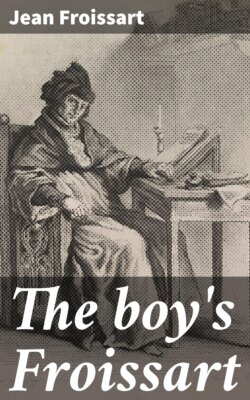Читать книгу The boy's Froissart - Froissart Jean - Страница 13
На сайте Литреса книга снята с продажи.
CHAPTER IX.
The Coronation of King Edward the Third.
ОглавлениеTable of Contents
MOST of the followers of Sir John de Hainault having returned home, the queen gave leave to many of her household to return to their country-seats,—except a few of the nobles, whom she kept with her as her council,—expressly ordering them to come back at Christmas to a great court which at that time she intended to hold. When Christmas came, she held the court above mentioned; and it was very fully attended by all the nobles and prelates of the realm, as well as by the principal officers of the chief cities and towns. In this assembly it was determined that the kingdom could no longer remain without a sovereign; and when all the acts done by the king, or having his consent, had been read, the chiefs of the assembly consulted together, and agreeing that such a man was not worthy to be a king, neither to bear a crown nor the title of king, they unanimously resolved that his elder son and true heir, then present, should be crowned instead of the father. They ordered that his father should be kept a prisoner, having every attention paid to his rank, as long as he should live.
The young King Edward, since so fortunate in arms, was crowned with a royal diadem in the Palace of Westminster on Christmas Day, 1326. He completed his sixteenth year on the feast of the Conversion of St. Paul following.
At this coronation Sir John de Hainault and all his companions, noble or otherwise, were much feasted, and many rich jewels were given to him and those that staid with him. He and his friends remained during these grand feasts, to the great satisfaction of the lords and ladies that were there, until Twelfth Day; when he received information that the King of Bohemia, the Earl of Hainault his brother, and many great lords of France, had ordered a tournament to be proclaimed at Condé. Sir John, therefore, would no longer stay, notwithstanding their entreaties, from the great desire he had to attend this tournament to see his brother and the other princes, especially that gallant and generous prince, Charles, King of Bohemia.
When the young King Edward, his mother, and the barons, saw that it was not possible to detain him any longer, they gave him permission to depart, very much against their will. The king, by the advice of the queen, granted him an annuity of four hundred marks sterling, hereditable rent, to be held of him in fee, payable in the city of Bruges. He gave also to Philip de Chateaux, his principal esquire and chief counsellor, a hundred marks sterling of rent, to be paid at the same time and place. He ordered many knights to accompany him to Dover, and that his passage should be free of all cost. He presented the Countess de Garennes, sister to the Count de Bar, and some other ladies who had accompanied the queen to England, with many rich jewels, on their taking leave.
Sir John and his company immediately embarked on board the vessels prepared for them, to be in time for the tournament. The king sent with him fifteen young and hardy knights to attend him at this tournament, there to try their skill, and to get acquainted with the lords and knights that were to be there. Sir John and his company paid them all the attention in their power, and on this occasion tourneyed at Condé.
